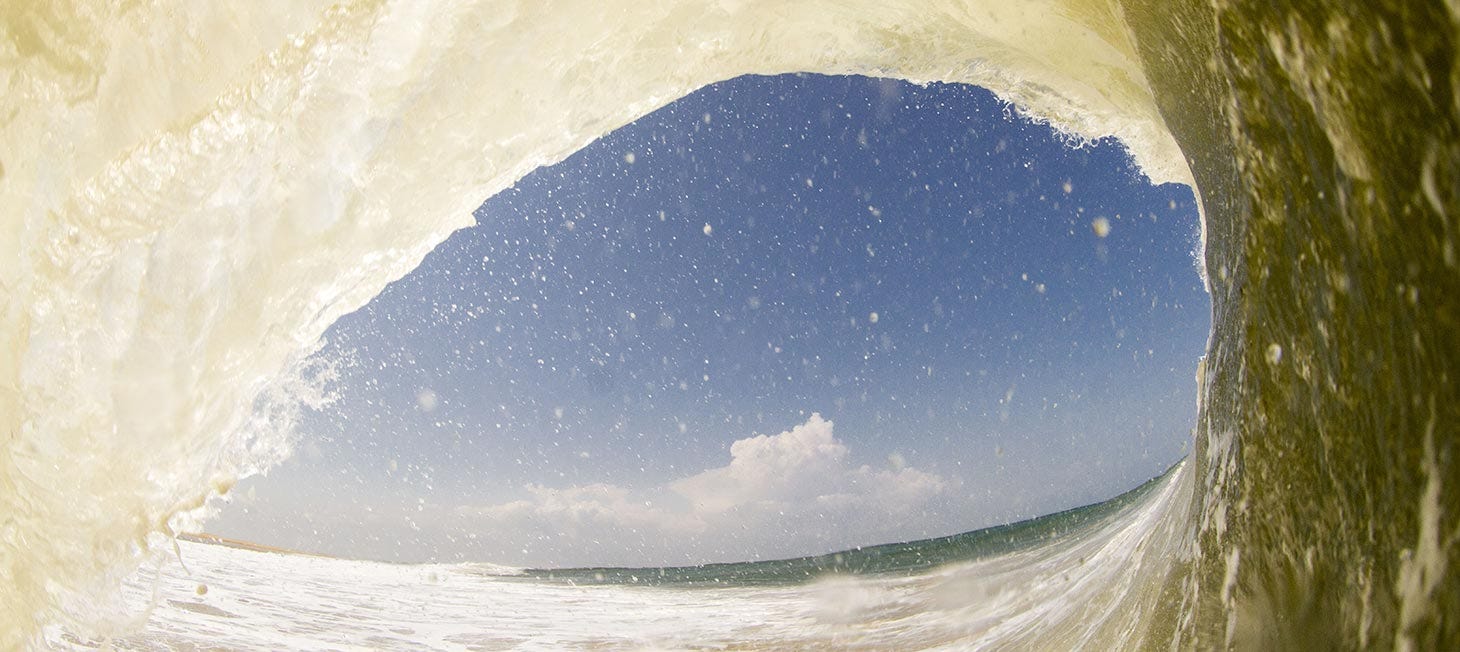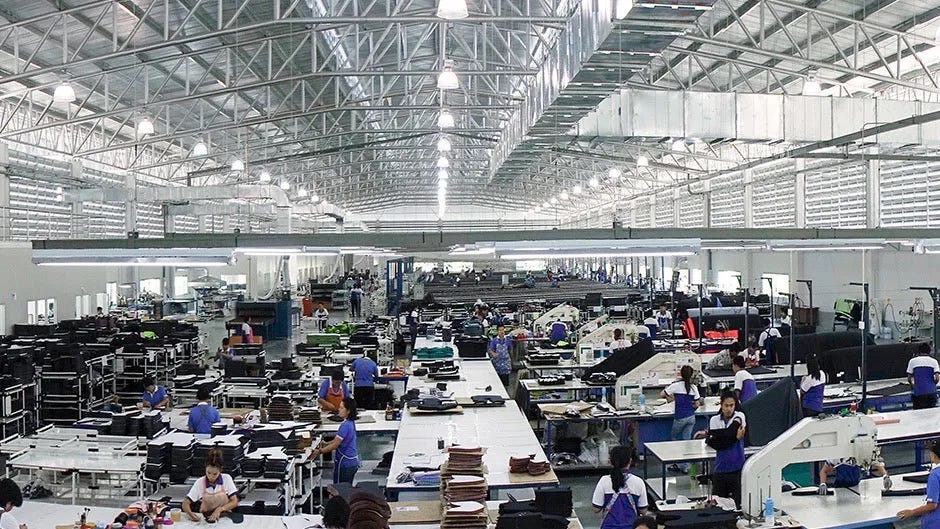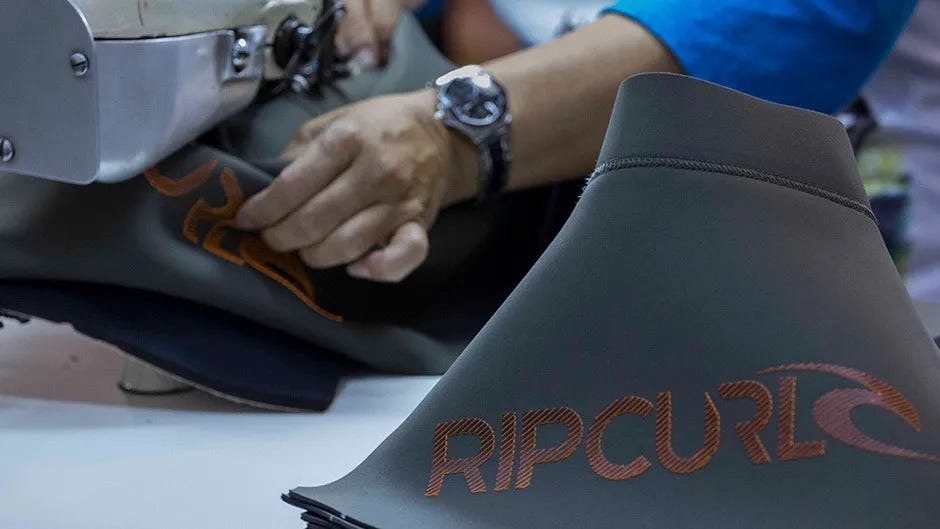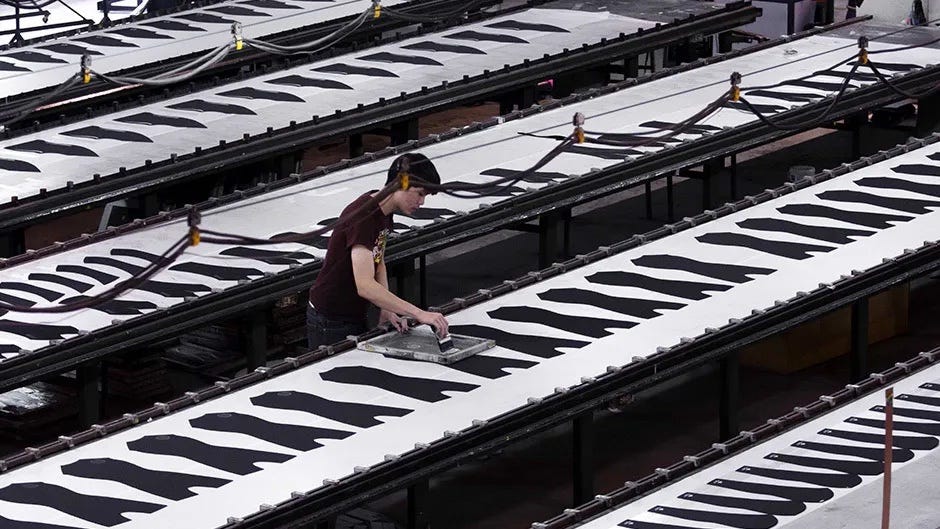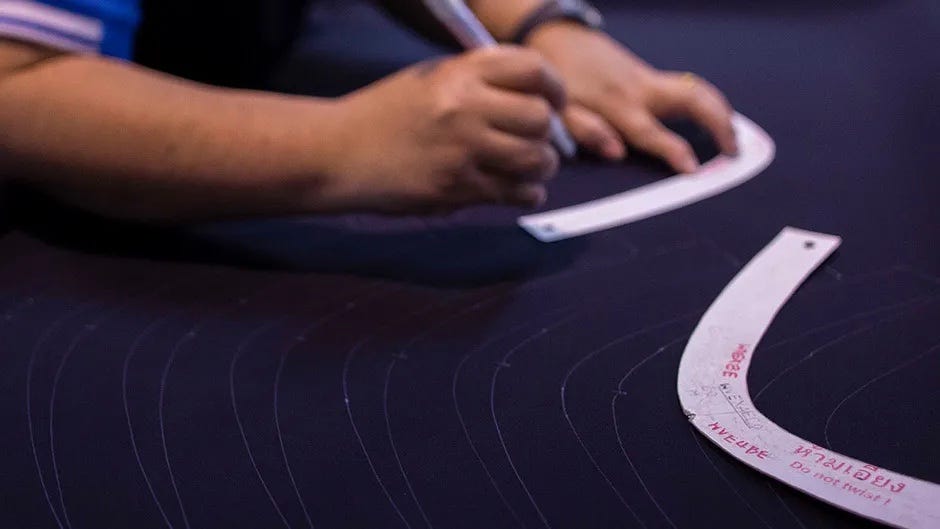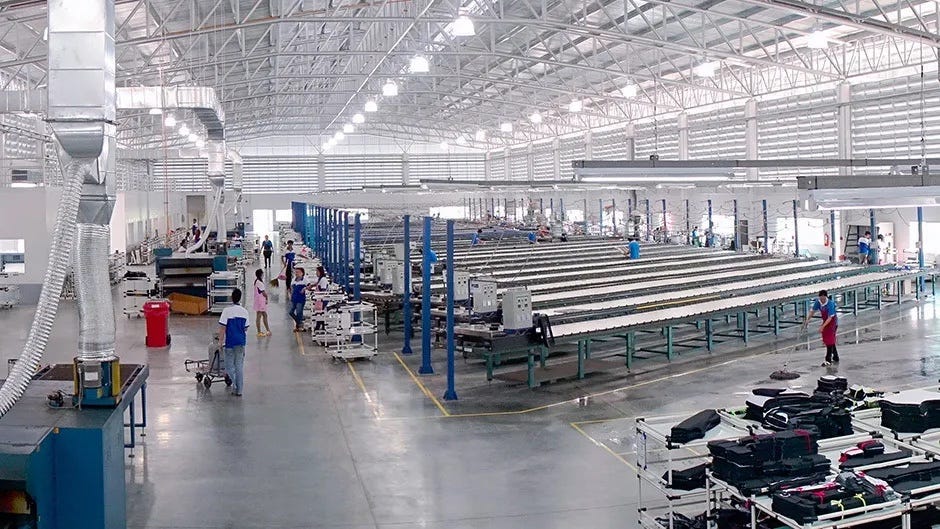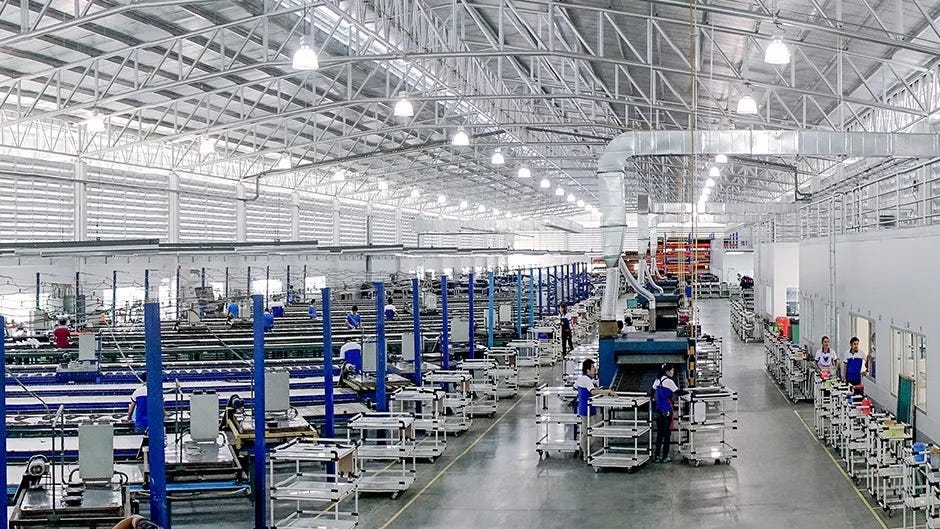Social Compliance
Rip Curl is a surfing company that was founded in 1969 by two surfers, Brian Singer and Doug Warbrick. For over 50 years the company has had a strong belief in fair play and consistent business practice.
Along the way, they crystalized how to do things the “Rip Curl Way” and developed a set Company Principles and Values which are now a daily road map for how we act and conduct ourselves as a company and crew. Those Principles and Values are...
- CUSTOMERS
- COMMITTED CREW
- CREATIVITY AND INNOVATION
- COMMUNITY & ENVIRONMENT
- HONESTY & INTEGRITY
But our commitment to these Principles and Values does not end outside the walls of Rip Curl offices and facilities. It extends to the places where our products are made, the factories that make them, and the people inside those factories.
By staying Committed to best and fair practice with our extended supplier Crew, we will deliver the most Creative and Innovative products to our Customers in the safest and best manner. By constantly checking ourselves when selecting and working with our suppliers, and also by maintaining Honesty and Integrity in that process, we will manage to work with good social compliance in the Community and Environment in which those suppliers live.
Being a forward thinking environmentally friendly business is an ongoing concern. Rip Curl understands that the world knows more now about the effects of human actions on our planet, than at any other time in history. Therefore, we believe it is our responsibility to try harder to be better in this area and match our actions with our company Principles and Values.
Applying these Principles and Values holds us accountable, and reminds us how important it is to ensure that the workers who make Rip Curl products are treated fairly, in accordance with local and international laws (and accepted international standards of compliance). At Rip Curl we recognize that our Crew is the backbone of our business, and we expect our business partners to understand that and respect the rights of their Crews equally.
By staying Committed to best and fair practice with our extended supplier Crew, we will deliver the most Creative and Innovative products to our Customers in the safest and best manner. By constantly checking ourselves when selecting and working with our suppliers, and also by maintaining Honesty and Integrity in that process, we will manage to work with good social compliance in the Community and Environment in which those suppliers live.
Being a forward thinking environmentally friendly business is an ongoing concern. Rip Curl understands that the world knows more now about the effects of human actions on our planet, than at any other time in history. Therefore, we believe it is our responsibility to try harder to be better in this area and match our actions with our company Principles and Values.
Applying these Principles and Values holds us accountable, and reminds us how important it is to ensure that the workers who make Rip Curl products are treated fairly, in accordance with local and international laws (and accepted international standards of compliance). At Rip Curl we recognize that our Crew is the backbone of our business, and we expect our business partners to understand that and respect the rights of their Crews equally.
We take the same approach to our Environmental Policy, matching our actions with our company Principles and Values.
With this general intention in mind, Rip Curl also recognizes the breadth of its supplier base – its capacity to influence suppliers, and the level of sophistication of the supply chain. Reaching a satisfactory level of compliance among suppliers – in all areas of production ¬– is an ongoing process that requires time and effort, but this is a process to which Rip Curl is highly committed. Devoting resources is a necessary part of that.
Rip Curl’s intention is to purchase merchandise solely from sources that adhere to and respect the Principles, Values and standards that Rip Curl holds paramount.
All merchandise is to be manufactured in accordance with all applicable laws of the respective country of manufacturer, as well as relevant international standards. It is also a fundamental element of our relationship that all production is undertaken at the agreed factories that have been inspected and approved by Rip Curl. No unauthorized sub-contracting, outsourcing or any other diversion of production from the agreed factories is allowed under any circumstances.
Rip Curl has developed the following fundamental principles, which constitute Rip Curl’s Factory Workplace Code of Conduct, and our Environmental Policy.
With this general intention in mind, Rip Curl also recognizes the breadth of its supplier base – its capacity to influence suppliers, and the level of sophistication of the supply chain. Reaching a satisfactory level of compliance among suppliers – in all areas of production ¬– is an ongoing process that requires time and effort, but this is a process to which Rip Curl is highly committed. Devoting resources is a necessary part of that.
Rip Curl’s intention is to purchase merchandise solely from sources that adhere to and respect the Principles, Values and standards that Rip Curl holds paramount.
All merchandise is to be manufactured in accordance with all applicable laws of the respective country of manufacturer, as well as relevant international standards. It is also a fundamental element of our relationship that all production is undertaken at the agreed factories that have been inspected and approved by Rip Curl. No unauthorized sub-contracting, outsourcing or any other diversion of production from the agreed factories is allowed under any circumstances.
Rip Curl has developed the following fundamental principles, which constitute Rip Curl’s Factory Workplace Code of Conduct, and our Environmental Policy.
Factory Workplace Code of Conduct
Transparency: In order to do business with rip curl, suppliers must commit to full transparency in their supply chain. The supplier must seek the approval for all primary and/or subcontracted facilities prior to production. In addition, the rip curl may seek to extend transparency further down the supply chain.
Compliance with the law: In order to do business with rip curl, a supplier is expected to comply with all relevant and applicable laws and regulations of the country in which workers are employed and to implement the workplace code in their applicable facilities. When differences or conflicts in standards arise, suppliers are expected to apply the highest standard.
Employment relationship: Employers shall adopt and adhere to rules and conditions of employment that respect workers and, at a minimum, safeguard their rights under national and international labor and social security laws and regulations.
Nondiscrimination: No person shall be subject to any discrimination in employment, including hiring, compensation, advancement, discipline, termination or retirement, on the basis of gender, race, religion, age, disability, sexual orientation, gender identity, nationality, political opinion, social group or ethnic origin.
Harassment or abuse: Every employee shall be treated with respect and dignity. No employee shall be subject to any physical, sexual, psychological, or verbal harassment or abuse.
Responsible recruitment: No worker shall pay for their job; all workers shall retain control of their travel documents and have full freedom of movement; and all workers shall be informed of the basic terms of their employment before leaving their home country or region.
Modern slavery: There shall be no slavery of any kind in the supplier’s supply chain. This includes the use of forced labor, human trafficking, prison labor, indentured labor, bonded labor or other forms of labor facilitated by any form of coercion or deception. Workers are not required to lodge deposits or their identity papers with their employer and are free to leave their employer after reasonable notice.
Compliance with the law: In order to do business with rip curl, a supplier is expected to comply with all relevant and applicable laws and regulations of the country in which workers are employed and to implement the workplace code in their applicable facilities. When differences or conflicts in standards arise, suppliers are expected to apply the highest standard.
Employment relationship: Employers shall adopt and adhere to rules and conditions of employment that respect workers and, at a minimum, safeguard their rights under national and international labor and social security laws and regulations.
Nondiscrimination: No person shall be subject to any discrimination in employment, including hiring, compensation, advancement, discipline, termination or retirement, on the basis of gender, race, religion, age, disability, sexual orientation, gender identity, nationality, political opinion, social group or ethnic origin.
Harassment or abuse: Every employee shall be treated with respect and dignity. No employee shall be subject to any physical, sexual, psychological, or verbal harassment or abuse.
Responsible recruitment: No worker shall pay for their job; all workers shall retain control of their travel documents and have full freedom of movement; and all workers shall be informed of the basic terms of their employment before leaving their home country or region.
Modern slavery: There shall be no slavery of any kind in the supplier’s supply chain. This includes the use of forced labor, human trafficking, prison labor, indentured labor, bonded labor or other forms of labor facilitated by any form of coercion or deception. Workers are not required to lodge deposits or their identity papers with their employer and are free to leave their employer after reasonable notice.
Child labor: No person shall be employed under the age of 15 or under the age for completion of compulsory education, whichever is higher.
Freedom of association and collective bargaining: Employers shall recognize and respect the right of employees to freedom of association and collective bargaining.
Health, safety, and workplace environment: Employers shall provide a safe and healthy workplace setting to prevent accidents and injury to health arising out of, linked with, or occurring in the course of work or as a result of the operation of employers’ facilities. Employers shall adopt responsible measures to mitigate negative impacts that the workplace environment has no workers..
Hours of work: Employers shall not require workers to work more than the regular and overtime hours allowed by the law of the country where the workers are employed. The regular work week shall not exceed 48 hours. Employers shall allow workers at least 24 consecutive hours of rest in every seven-day period. All overtime work shall be voluntary and consensual. Employers shall not request overtime on a regular basis and shall compensate all overtime work at a premium rate. Other than in exceptional circumstances, the sum of regular and overtime hours in a week shall not exceed 60 hours.
Compensation: Every worker has a right to compensation for a regular work week that is sufficient to meet the worker’s basic needs and provide some discretionary income. Employers shall pay at least the minimum wage or the appropriate prevailing wage, whichever is higher, comply with all legal requirements on wages, and provide any fringe benefits required by law or contract. Where compensation does not meet workers’ basic needs and provide some discretionary income, each employer shall work with rip curl to take appropriate actions that seek to progressively realize a level of compensation that does.
Environment: Business partners of rip curl are required to comply with all applicable environmental laws, rules and regulations at their facilities and in the communities in which they operate, particularly with respect to water, energy, hazardous chemicals, air quality and waste. Further, rip curl expects its business partners to incorporate environmentally responsible practices into all of their activities that relate to their business with Rip Curl.
Freedom of association and collective bargaining: Employers shall recognize and respect the right of employees to freedom of association and collective bargaining.
Health, safety, and workplace environment: Employers shall provide a safe and healthy workplace setting to prevent accidents and injury to health arising out of, linked with, or occurring in the course of work or as a result of the operation of employers’ facilities. Employers shall adopt responsible measures to mitigate negative impacts that the workplace environment has no workers..
Hours of work: Employers shall not require workers to work more than the regular and overtime hours allowed by the law of the country where the workers are employed. The regular work week shall not exceed 48 hours. Employers shall allow workers at least 24 consecutive hours of rest in every seven-day period. All overtime work shall be voluntary and consensual. Employers shall not request overtime on a regular basis and shall compensate all overtime work at a premium rate. Other than in exceptional circumstances, the sum of regular and overtime hours in a week shall not exceed 60 hours.
Compensation: Every worker has a right to compensation for a regular work week that is sufficient to meet the worker’s basic needs and provide some discretionary income. Employers shall pay at least the minimum wage or the appropriate prevailing wage, whichever is higher, comply with all legal requirements on wages, and provide any fringe benefits required by law or contract. Where compensation does not meet workers’ basic needs and provide some discretionary income, each employer shall work with rip curl to take appropriate actions that seek to progressively realize a level of compensation that does.
Environment: Business partners of rip curl are required to comply with all applicable environmental laws, rules and regulations at their facilities and in the communities in which they operate, particularly with respect to water, energy, hazardous chemicals, air quality and waste. Further, rip curl expects its business partners to incorporate environmentally responsible practices into all of their activities that relate to their business with Rip Curl.
Rip Curl Owned Factory
Since 1989, Rip Curl owns and operates a large state-of-the-art wetsuit manufacturing facility “Onsmooth Thai Co., Ltd” located at 143 Moo 7 Thawangtarn, Saraphee, Chaingmai, Thailand. The factory employs around 650 workers and is one of the largest employers in the region. Operating this facility allows us to control the environmental impact of this production, as well as pricing, lead times and entitlements for our workers, all while allowing us to develop the ultimate surfing wetsuits.
Rip Curl respects and advocates for the right of all workers to achieve a decent standard of living. Rip Curl pays all Onsmooth factory workers a living wage. A living wage is an estimated wage for a full-time worker to be able to afford a decent standard of living for themselves and their family without working overtime. This is significant because most factory workers in the apparel industry do not earn a living wage.
Rip Curl supports the use of the Anker Methodology in estimating living wages, due to its detailed, transparent research in collaboration with local communities. Achieving a living wage at OnSmooth is part of Rip Curl’s broader fair compensation program focused on supporting the right of all workers to achieve a decent standard of living.
Rip Curl respects and advocates for the right of all workers to achieve a decent standard of living. Rip Curl pays all Onsmooth factory workers a living wage. A living wage is an estimated wage for a full-time worker to be able to afford a decent standard of living for themselves and their family without working overtime. This is significant because most factory workers in the apparel industry do not earn a living wage.
Rip Curl supports the use of the Anker Methodology in estimating living wages, due to its detailed, transparent research in collaboration with local communities. Achieving a living wage at OnSmooth is part of Rip Curl’s broader fair compensation program focused on supporting the right of all workers to achieve a decent standard of living.
Rip Curl Supply Chain
Due to Rip Curl’s wide technical product range, our supply chain is diverse and widely spread. Regular factory visits and close supplier engagement are a major part of ensuring our supply chain is transparent. Rip Curl’s factory list is publicly available via the Open Supply Hub which is a collaborative, supply chain mapping platform that includes the location and details of production facilities. Filter by selecting KMD Brands as the Data Contributor and Rip Curl from the Contributor List.
Audits of our Suppliers
Rip Curl works with Elevate, a leading global quality standards auditor, to perform audits on our behalf. Using the ERSA (ELEVATE Responsible Sourcing Assessment) format, Rip Curl ensures our factories are upholding our Workplace Code of Conduct and adhering to local laws protecting factory workers and the environment.
Environmental Policy
Since the beginning Rip Curl has actively contributed to its local communities, through employment opportunities made available and through supporting relevant community groups and issues, particularly maintenance of the coastal environments. We also have a strong determination to be environmentally responsible, and we encourage our crew to participate in achieving this. The below points guide the crew in achieving our Value of “Community and the Environment”, that constitutes our Environmental Policy.
In practical terms, our commitment to improving the environmental sustainability of our operations extends to:
- Design and develop innovative products that are durable and long-lasting to extend product life and reduce overall consumption, considering the impact of each stage of the production cycle on the environment.
- Bring added value to product design and manufacturing, such as eco-friendly and recycled materials.
- Continue to grow our understanding and search for new methods in all aspects of the production process, with the end goal of reducing our impact on the environment.
- Reduce our use of plastics throughout the production and delivery process of our products.
- Respect the people and the land in which our products are produced.
- Give back to the local community and environment in which our offices and suppliers are located.
- Demonstrate honest and ethical behaviour in all that we do.
In practical terms, our commitment to improving the environmental sustainability of our operations extends to:
- In 2022 we became B Corp certified, which means we are committed to accountability, transparency, and continuous improvement across all areas of our business including our employees, supply chain workers and the environment.
- For over 22 years all of our warehouse and office crew spend a day a year (Rip Curl Planet Day) working to rehabilitate the natural environment in their local areas (tree planting at Bells Beach, cleaning up the beach at Trestles, tending to the sand dunes in Hossegor).
- We support like-minded environmental organisations at a local level, in line with our Principles and Values, and we see that by giving control of this to our local regions, we can make a daily difference with the many small organisations that work hard in this space.
- The Rip Curl Pro Bells Beach is the longest running professional surfing contest in history. It is also a “Waste Wise” accredited event, with on average 80% of all rubbish generated during the event window sifted into recycling piles and delivered to appropriate waste facilities.
- In 2018 we launched Australia’s first take-back program that recycled used Surfing Wetsuits. This program accepts any surf brand wetsuits and Rip Curl pays for the recycling process saving them from ended up in landfill. In 2021 we expanded the program across and Australia. Used wetsuits have been turned into matting, that was used in children’s playgrounds and sporting fields. In 2022 we expanded Globally and this program is now offered across France, Spain, Portugal, the USA and Australia. How epic is that!
- In 2022 we partnered with AirStep in Melbourne where 50% of our wetsuit offcut waste is being sent and turned into carpet underlay.
- We support our factories in the onboarding, use, verification and to make improvements of their HIGG Facility reporting modules for their operations including Environmental (FEM) and Social Labor (FSLM).
- We use the HIGG FEM to monitor our own Wetsuit factory environmental management and support improvements across water usage, wastage, chemical usage, and energy.
- We have reduced the individual packaging requirements surrounding our products, which has vastly reduced the waste on hand each week in our warehouses.
- We introduced a new polybag that contains 40% less plastic by weight and made with 30% recycled plastic. We are planning to move to a 100% recycled content in 2023.
- We introduced new swing tags that are a mix of Forest Stewardship Council (FSC) recycled paper and paper from controlled woods.
- We are a signatory of the Australian Packaging Covenant, continuing to collaborate with other industries on sustainable packaging solutions.
- We have eradicated the use of plastic bags in our retail network.
- We have installed solar panels to create renewable energy at our Thailand Wetsuit factory, Torquay Head Office and warehouse, and at our retail stores; in Rye, Mornington, Baines Crecent, and Byron Bay, reducing our consumption of power and electricity.
- We have changed to low halogen lightbulbs, increasing energy efficiency in-office across the RCG.
- In 2020 we released our first sustainability report.
- We then shared our progress in 2021 sustainability report. which highlights some big projects completed, like tracking our operational carbon emissions for the first time with Toitu Envirocare under their CarbonReduce certification.
- In 2022 we moved to Integrated reporting as a group under KMD Brands, which provides readers a review of our financial, economic, social and environmental performance. Additional disclosures include Global Reporting Initiative (GRI) standards Core option, Task Force on Climate-related Financial Disclosures (TCFD) and Climate Disclosure Project (CDP) reporting.
- In 2022 we submitted our climate targets and in 2023 they were validated by the Science Based Targets Initiative. This is a huge business commitment as we transition to a low-carbon future.
COVID-19 Fashion Commitments
As the COVID-19 pandemic continues across the world, the health and well-being of our supply chain is of paramount importance to us here at Rip Curl and whilst we alone cannot resolve this crisis we are committed to working in collaboration with other brands, companies and NGO’s.
By joining companies across Australia and New Zealand, Rip Curl shall be supporting the Baptist World Aid COVID Fashion Commitments to help and protect suppliers and the workers throughout the global fashion supply chain.
The 6 Baptist World Aid COVID Fashion Commitments are:
By joining companies across Australia and New Zealand, Rip Curl shall be supporting the Baptist World Aid COVID Fashion Commitments to help and protect suppliers and the workers throughout the global fashion supply chain.
The 6 Baptist World Aid COVID Fashion Commitments are:
- We commit to support worker’s wages by honouring supplier commitments
- We commit to identify and support those workers at greatest risk
- We commit to listen to the voices and experience of workers
- We commit to ensuring worker’s rights and safety are respected
- We commit to collaborate with others to protect vulnerable worker’s
- We commit to build back better for workers and the world
Over the coming months we will be able to share more information with you on the actions we have taken and are continuing to take through this crisis.
Update:
The release of the official 2020 COVID Fashion Report based on information collected by Baptist World Aid from January to July 2020 confirmed that Rip Curl already had in place a number mechanisms to meet 4 of the 6 commitments. During this time, we were working on programs that would fully meet all 6 commitments which are now all in place.
We honored our supplier commitments throughout this crisis and continue to do so. Ensuring that we remain compliant and transparent we have aligned our supply chain management program with our parent company Kathmandu Group Holdings under the services of Elevate, which has allowed us to identify our strengths and our weakness, helping us to move forward with a more effective strategy for the future. We have also rolled out a social media-based grievance mechanism enabling all workers to have their voices heard whilst protecting their identity.
We remain committed to working in collaboration with others through industry forums and roundtables to come together to discuss and shares ideas and practices.
Rip Curl is invested in ensuring that we are focused on our social and environmental responsibilities. We do this not because we are told to but we because it is the right thing to do, we are a company that puts people before profit because if we didn’t, we wouldn’t be Rip Curl.
Update:
The release of the official 2020 COVID Fashion Report based on information collected by Baptist World Aid from January to July 2020 confirmed that Rip Curl already had in place a number mechanisms to meet 4 of the 6 commitments. During this time, we were working on programs that would fully meet all 6 commitments which are now all in place.
We honored our supplier commitments throughout this crisis and continue to do so. Ensuring that we remain compliant and transparent we have aligned our supply chain management program with our parent company Kathmandu Group Holdings under the services of Elevate, which has allowed us to identify our strengths and our weakness, helping us to move forward with a more effective strategy for the future. We have also rolled out a social media-based grievance mechanism enabling all workers to have their voices heard whilst protecting their identity.
We remain committed to working in collaboration with others through industry forums and roundtables to come together to discuss and shares ideas and practices.
Rip Curl is invested in ensuring that we are focused on our social and environmental responsibilities. We do this not because we are told to but we because it is the right thing to do, we are a company that puts people before profit because if we didn’t, we wouldn’t be Rip Curl.
KMD Brands Modern Slavery Statement 2022
The KMD Brands Modern Slavery Statement describes the steps taken by both Rip Curl and Kathmandu to address the risks of modern slavery throughout our supply chain during the financial year ending 31st July 2022. This statement is published in accordance with the Australian Modern Slavery Act 2018.
Our statement highlights the ways in which, consistent with its Company Principles and Brand Values, Rip Curl is complying with anti-slavery legislation and working alongside others to identify and address the risks of modern slavery in its business and supply chain.
Our statement highlights the ways in which, consistent with its Company Principles and Brand Values, Rip Curl is complying with anti-slavery legislation and working alongside others to facilitate a positive social change, to access and address the risks of modern slavery in its business and supply.
‘The Search’ is the driving force that led to the creation of Rip Curl and this continues throughout the company today ……The Search never ends…... We believe that everyone should be afforded the freedom to explore their own personal Search.
Rip Curl is not here to put profit before people.
‘The Search’ is the driving force that led to the creation of Rip Curl and this continues throughout the company today ……The Search never ends…... We believe that everyone should be afforded the freedom to explore their own personal Search.
Rip Curl is not here to put profit before people.
Restricted Substances Management
Chemistry plays an integral role in the creation of epic surfing products. Rip Curl recognises the importance of reducing the social and environmental impact of our chemical use through regulatory compliance and supporting our suppliers to meet our high expectations. We expect all suppliers to maintain an effective chemicals management program in line with our Code of Conduct, and we assess performance using tools such as the Higg FEM and random shipment testing.
The Rip Curl Restricted Substances list (RSL) is an agreement signed with our suppliers to ensure Rip Curl products comply with relevant chemical regulations. This forms part of detailed guidance provided to suppliers on chemical restrictions. Rip Curl’s current RSL can be viewed here.
The Rip Curl Restricted Substances list (RSL) is an agreement signed with our suppliers to ensure Rip Curl products comply with relevant chemical regulations. This forms part of detailed guidance provided to suppliers on chemical restrictions. Rip Curl’s current RSL can be viewed here.
Animal Welfare Statement
The protection and respect of animals is an integral part of Rip Curl’s philosophy. Rip Curl recognises the need to ensure commitment to animal welfare extends throughout our supply chain. This statement complements our Supplier Code of Conduct and has been developed in line with our partners in the KMD Brands Group. It covers all virgin animal fibres Rip Curl currently uses and guides the future sourcing of new virgin fibres. It does not cover recycled materials.
Prohibited Animal Fibres:
The following animal fibres and materials are not used in any Rip Curl products:
Suppliers are encouraged to source certified ‘non-mulesed’ wool.
Leather:
Rip Curl sources leather accessories products from Leather Working Group (LWG) certified suppliers, where skins are sourced from a LWG rated tannery. 100% of Rip Curl sheepskins are sourced from Australian farms from LWG certified suppliers. All sheepskins are a by-product of the meat industry. Leather trim material is sourced from a LWG certified supplier.
Real Down or Feathers:
The filling of down and feathers in products must be Responsible Down Standard-certified or equivalent standard.
Rip Curl Commitments:
Rip Curl is committed to investment in robust certification systems for animal products. We also encourage designers to consider plant-based alternatives to animal-derived products.
Traceability:
Rip Curl is committed to increasing traceability and transparency across our entire supply chain. This is particularly important in relation to animal products, where we prioritise traceability back to primary production.
Supplier Expectations:
Rip Curl expects suppliers to use all reasonable efforts to care for animals in a humane manner. Suppliers must meet all local and national laws related to animal welfare and comply with Rip Curl’s standards within their own operations. Suppliers must also take all reasonable steps to assess and manage compliance within their own supply chain, including sharing Rip Curl standards with their suppliers. Rip Curl suppliers receive regular training on these standards.
Prohibited Animal Fibres:
The following animal fibres and materials are not used in any Rip Curl products:
- Endangered and Threatened Species, such as crocodile or snake skins, or any species listed in the IUCN Red List of Threatened Species or Convention on International Trade in Endangered Species of Wild Fauna and Flora.
- Any form of real animal fur, including, but not limited to, rabbit, fox and angora.
- Any exotic animal hair, including, but not limited to, pashmina, cashmere, alpaca and llama.
Suppliers are encouraged to source certified ‘non-mulesed’ wool.
Leather:
Rip Curl sources leather accessories products from Leather Working Group (LWG) certified suppliers, where skins are sourced from a LWG rated tannery. 100% of Rip Curl sheepskins are sourced from Australian farms from LWG certified suppliers. All sheepskins are a by-product of the meat industry. Leather trim material is sourced from a LWG certified supplier.
Real Down or Feathers:
The filling of down and feathers in products must be Responsible Down Standard-certified or equivalent standard.
Rip Curl Commitments:
Rip Curl is committed to investment in robust certification systems for animal products. We also encourage designers to consider plant-based alternatives to animal-derived products.
Traceability:
Rip Curl is committed to increasing traceability and transparency across our entire supply chain. This is particularly important in relation to animal products, where we prioritise traceability back to primary production.
Supplier Expectations:
Rip Curl expects suppliers to use all reasonable efforts to care for animals in a humane manner. Suppliers must meet all local and national laws related to animal welfare and comply with Rip Curl’s standards within their own operations. Suppliers must also take all reasonable steps to assess and manage compliance within their own supply chain, including sharing Rip Curl standards with their suppliers. Rip Curl suppliers receive regular training on these standards.

